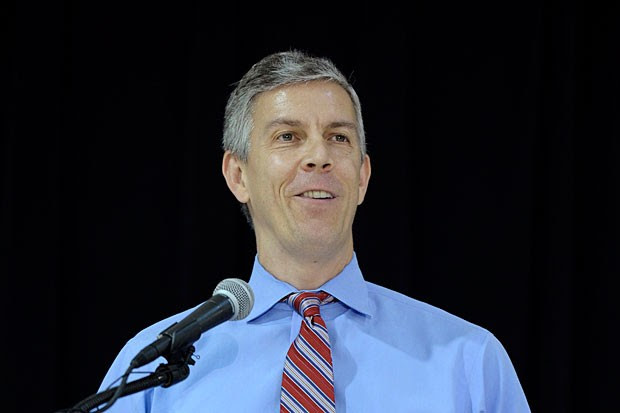Arne Duncan: School Expectations Are Too Low in the United States
‘Our children who need more get less,’ he told parent leaders from around the nation
January 14, 2014

Part of the reason students in other countries outpace American students on international exams, Secretary of Education Arne Duncan said, is because they are more serious about education, not just in their cultures, but in their policies.
Today’s parent advocates do not limit themselves to coaching soccer teams and organizing bake sales as a way to get involved in their students’ schools. But parents, educators and policymakers alike need to do more to “walk the walk” in working to close achievement gaps and improve education in the United States, Secretary of Education Arne Duncan told an audience of parent leaders Monday.
While other countries have made strides in student performance on international tests in reading, math and science, American students have stagnated, and in some cases regressed, while achievement gaps in the country remain “staggeringly large,” Duncan said at an education summit for parent leaders hosted by the National Assessment Governing Board.
Comparing American students to those in South Korea – a country that ranks among the highest in the world in terms of academic achievement – Duncan said part of the problem is a culture in the United States that perpetuates low expectations in schools. Parents in the United States do not demand the same kind of educational excellence as those in other countries, he said.
“As you think about how to use your voice, your time, and your energy, I want to pose one simple question to you: Does a child in South Korea deserve a better education than your child?” Duncan said. “If you answer is no – that no child in America deserves any less than a world-class education – then your work is cut out for you.”
Part of the reason students in other countries outpace American students on these exams, Duncan said, is simply because they are more serious about education, not just in their cultures, but in their policies.
The former head of the Chicago public school system, Duncan told parents that there is a sense of complacency regarding education in the United States, but also a lack Duncan said, but also a lack of action by politicians.
“Both South Korean and U.S. citizens believe that the caliber of teacher matters tremendously, and the great teachers make a huge difference in children’s lives,” Duncan said. “The difference is: they act on their belief. We don’t. We talk the talk, and they walk the walk.”
While teachers in America often come from the bottom of the academic barrel and are disproportionately teaching students from disadvantaged backgrounds, Duncan said, teachers in South Korea are selected from the top of the class and are rewarded for working with low-income students.
Still, when people see statistics showing that by age 24, students from high income backgrounds earn bachelor’s degrees at almost seven times the rate of those from low income families, they often blame poor academic achievement on the students’ race, their family background or their cultures – not the school or school leaders, said Kati Haycock, president of The Education Trust.
“Our question back to them is if you’re right, why are low income students and students of color performing so much higher in some schools?” Haycock said.
Haycock gave examples of schools across the country – such as Halle Hewetson Elementary in Las Vegas, George Hall Elementary in Mobile, Ala., and Elmont Memorial Junior-Senior High School in Elmont, N.Y. – with high numbers of minority and low-income students and histories of poor performance that were able to turn around due to changes in leadership, teachers, staff training and parent involvement.
Now, students in those schools are outperforming students throughout the state.
Not only does the quality of the teachers matter for low income and minority students to improve academically, said Charles Payne of the University of Chicago. Students from those backgrounds also benefit more from more rigorous standards, but are the least likely to gain access to them – and it’s up to parents to work with schools to push for those higher expectations, he said.
But because people are often “skittish” about bringing up issues of race, Payne encouraged parents to “ask a lot of questions,” about how race relates to education and work to build trust between parents, teachers and students.
“Schools that pride themselves on color blindness … are living in a false world,” said Payne, a professor in the university’s School of Social Service Administration. “That is simply a lie. If you live in America, you see race.”
Otha Thornton, president of the National PTA, said parents should take that next step to become more “connected, dedicated, and advocacy-minded” to drive change within American schools, rather than standing on the sidelines.
“Accountability for education begins at home. But unfortunately, not all children have an advocate at home,” Thornton said. “Be committed to speak up and speak out, and sometimes show out, to ensure that no child falls through the cracks.”

